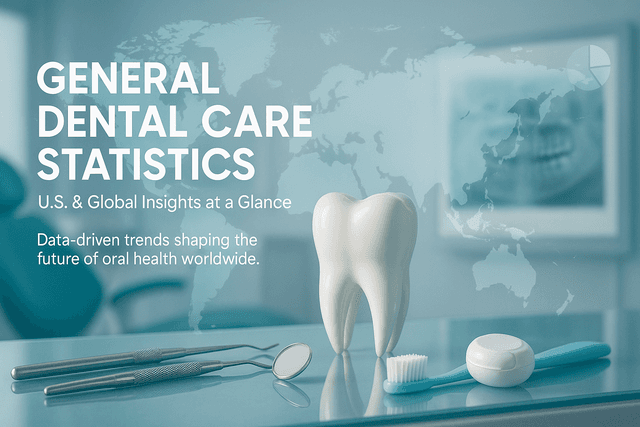Oral Health
6 min read
Jul 24, 2025
How Much Ibuprofen to Take for Toothache? Dosage, Timing, and Safety Tips
Tooth pain can strike at the worst times, during meals, at bedtime, or right before a big meeting. When it does, many people reach for ibuprofen to get fast relief. But how much is safe to take, and how often? Understanding the right dosage can help you stay comfortable without putting your health at risk.

Ah, the dreaded toothache. One minute you're minding your business, sipping your coffee, and the next, bam, a sharp jolt of tooth pain ruins your day. Whether it’s a pesky cavity, swollen gums, or the aftermath of dental procedures like a root canal, ibuprofen can be a reliable go-to for pain relief. But how much ibuprofen is safe? And how often can you take it without turning your bathroom into a DIY pharmacy?
Let’s break it down in a way that’s clear, safe, and doesn’t require a PhD in dentistry or pharmacology.
Ibuprofen and Tooth Pain
Ibuprofen is one of the most commonly used medications for managing dental pain in adults. It's part of a family of drugs called NSAIDs (non-steroidal anti-inflammatory drugs), which help reduce pain and inflammation. That’s especially useful when you’re dealing with oral pain from swelling, infection, or sore gums.
So if your cheek is puffed out like a chipmunk or you feel like your molar is throbbing to the beat of a drum, ibuprofen may be the anti-inflammatory drug you need.
Toothache Relief and How Ibuprofen Can Help
Here’s what makes ibuprofen stand out. It doesn’t just block pain signals, it actually targets inflammation, which is often the root cause of toothache. That means ibuprofen can help ease pain and reduce swelling around the painful area, giving you more than just a short break from the discomfort experienced.
Whether you’re dealing with an abscess, a cracked filling, or pain after getting dental implants, ibuprofen is a pain-relieving MVP that dentists often recommend.
Take Ibuprofen Safely with the Right Dosage
Okay, here’s where things get serious. You want pain relief, not a trip to the ER.
Ibuprofen is available as a tablet or capsule, commonly in 200mg and 400mg doses over the counter. For dental pain, adults often take 400mg every 6 hours as needed. That’s not a free pass to pop tablets like candy, stick to the recommended dose.
The maximum daily dose of ibuprofen for healthy adults is typically 1,200mg over-the-counter or up to 3,200mg under a doctor’s supervision. Most people can take 400mg three times a day for short-term dental pain without issues. But don’t exceed 600mg in one go unless a dentist or doctor gives you the green light.
Quick tip: Always check the label and read the leaflet inside the medicine box for your specific product, whether it’s Advil, Motrin, or a store-brand ibuprofen. And drink a full glass of water with each tablet, it helps protect your stomach lining.
Pain Relief Beyond Ibuprofen
Sometimes ibuprofen isn’t enough, especially if your pain is severe or related to a deep infection. In those cases, your dentist may prescribe stronger pain medications like codeine, hydrocodone, or oxycodone. These are opioids, and while they can be effective for short-term acute pain, they come with a risk of dependence, so they’re usually used as a last resort.
Another option? Combining ibuprofen with acetaminophen (Tylenol). These two work in different ways, ibuprofen is anti-inflammatory, while acetaminophen is a straight-up analgesic. Used together in alternating doses (like ibuprofen at 8am, acetaminophen at 10am), they can offer even better relief than an opioid without the heavy side effects.
Just don’t mix them in the same dose unless directed by your primary care physician.
What About Tablets and Other Forms?
Ibuprofen comes in various forms, tablets, soft-gels, slow-release capsules, and even liquids. The standard 200mg or 400mg tablets are the most common for dental issues. People can take these after meals to reduce stomach irritation.
If you’re picking it up at the pharmacy, don’t be shy, ask the pharmacist about the best option for you. They're a great resource for medicines information, and they won’t judge you for wincing every time you talk.
Home Remedies That May Help Ease Tooth Pain
While ibuprofen is often the hero, a few simple remedies might help reduce discomfort in the meantime:
Clove oil: This old-school remedy has numbing properties. Dab a bit on the painful area with a cotton swab. It smells like grandma’s spice rack, but it works.
Saltwater rinse: Swish warm saltwater to help reduce swelling and clean the area.
Cold compress: Great for swelling and for when you want to feel dramatic lying on the couch.
These won’t replace pain medication, but they can be nice sidekicks while waiting for the ibuprofen to kick in.
Advil, Motrin, and More
You’ve probably seen a dozen brands of ibuprofen. Advil, Motrin, and various store brands all contain the same active ingredient. The name doesn’t matter much, what counts is the dose.
Motrin and Advil both offer 200mg tablets over-the-counter. You can also find 300mg or 400mg tablets behind the counter or via prescription for more intense dental pain. The goal is always the same: use the lowest effective dose for the shortest amount of time.
Tylenol and Acetaminophen Options
If you can’t take NSAIDs due to stomach ulcers, a history of asthma, or hypersensitivity to aspirin, acetaminophen (Tylenol) may be your safer bet. It won’t reduce swelling like ibuprofen, but it can still help reduce pain.
Acetaminophen is usually safe when taken correctly, but go overboard and you risk serious liver damage. Adults should not exceed 4,000mg a day, and again, always check the label.
Can You Take Too Much?
Yes. Absolutely. And it’s easier than you’d think if you’re not paying attention. Taking too many tablets or combining ibuprofen with other NSAIDs like aspirin can damage your stomach, kidneys, or more. If you’re doubling up on medications or unsure what you’ve taken, stop and get advice.
Even over-the-counter medications can cause harm if misused.
Over-the-Counter Options for Dental Pain
Luckily, many effective options are available without a prescription. Ibuprofen and acetaminophen are your main players, but there are combo tablets and gels designed specifically for dental pain. Just make sure you’re not doubling up on the same ingredient from multiple products.
If you’re taking more than 600mg per dose or more than 2,400mg a day without talking to your dentist or doctor, you’re in risky territory. Stick with 400mg three to four times a day unless told otherwise. And if the pain is sticking around longer than a couple of days? That’s your cue to book an appointment.
When to See the Dentist
If toothache keeps coming back or you're relying on ibuprofen day after day, that pain is waving a red flag. It might be a cavity, abscess, or cracked tooth hiding under the surface. Ibuprofen can buy you time, but it won’t fix the problem.
Managing dental pain with medication is fine for short-term relief, but the only way to really get rid of the pain is to treat the cause.
Don’t wait until the tooth pain spreads, gets worse, or starts interfering with your sleep and eating. Your oral health deserves more than a Band-Aid.
Managing Dental Pain
Toothaches are no joke, but you don’t have to suffer. Ibuprofen is a reliable, affordable, and effective pain reliever that can help reduce pain and inflammation quickly. Just remember to follow the dosage instructions, avoid mixing medications without guidance, and reach out to a dentist if things don’t improve in a day or two.
Managing dental pain at home is a short-term fix, not a substitute for dental care. Whether it’s your first twinge of tooth pain or the third round of dental procedures this year, the right approach can make all the difference.
And if all else fails, there's always clove oil and a soft blanket while you wait for your appointment.
How Much Ibuprofen Should I Take for a Toothache?
Most adults can safely take 400mg of ibuprofen every 6 hours as needed for tooth pain, up to a maximum of 1,200mg per day without a prescription. For more severe pain, a dentist may recommend up to 600mg per dose or a higher total under supervision, but never exceed the dose listed on the label unless instructed by a healthcare provider.
Can I Combine Ibuprofen With Other Pain Relievers?
Yes, combining ibuprofen with acetaminophen (Tylenol) can be effective, since they work in different ways. Alternate doses (e.g., ibuprofen at 8am, acetaminophen at 10am) to help manage moderate to severe dental pain. However, do not take both at the same time unless advised by a doctor, and always stay within daily dose limits for each medication.
What Happens If I Take Too Much Ibuprofen?
Taking more than the recommended dose can lead to serious side effects like stomach ulcers, kidney damage, or internal bleeding. Symptoms of overdose may include nausea, dizziness, ringing in the ears, or difficulty breathing. If you think you've taken too much, seek medical help immediately.
When Should I See a Dentist Instead of Taking More Ibuprofen?
If your toothache lasts more than two days, worsens, or is accompanied by swelling, fever, or trouble eating or sleeping, it’s time to see a dentist. Ibuprofen can relieve pain temporarily, but it won’t fix the underlying issue, like a cavity, abscess, or cracked tooth, that needs professional treatment.
Read Next
Related Posts

Oral Health
What Is Mewing Trend? Origins, Science, and Results
From TikTok tutorials to teen slang, "mewing" has taken over the internet as the latest beauty and wellness craze. But beyond the social media hype, what exactly is mewing, and can it really transform your face or improve your jawline? This curious trend centers on one simple thing: where you rest your tongue.
4 min read
Sep 08, 2025

Oral Health
General Dental Care Statistics (U.S. & Global)
Dental health plays a crucial role in overall well-being, yet millions worldwide face barriers to routine care. This detailed statistics guide breaks down current dental health trends, costs, and challenges both in the United States and globally.
5 min read
Aug 21, 2025

Oral Health
Teeth Whitening Statistics & Trends
Teeth whitening has grown from a luxury procedure to a mainstream cosmetic treatment accessible to people worldwide. Consumers today are investing in their smiles as much as they invest in skincare, haircare, and personal style. Whether it’s for a job interview, a wedding, or just personal confidence, teeth whitening has become a regular part of aesthetic self-care.
4 min read
Aug 21, 2025
Don’t have time to research every dentist around you?
See why 30k+ patients trusted us